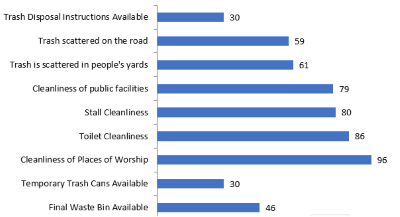Community Behavior towards Plastic Waste: Case Study in Nagari Batu Basa as a Traditional Village
DOI:
https://doi.org/10.24036/cived.v11i3.639Keywords:
Rubbish, Plastic, Behavior, Environment, PublicAbstract
Sumatra Barat is a halal tourist area but many people throw rubbish carelessly. This phenomenon is a big problem, because environmental issues and waste are world issues. This study reveals the causes of people's behavior of littering using quantitative and qualitative methods. Using 30 observers who monitored community activities for 10 days. The population of this research is the people of Nagari Batu Basa, Pariangan Tanah Datar, Sumatra Barat, consisting of three Jorong (hamlet), Jorong Batu Basa, Jorong Koto Baru, and Jorong Sialahan. The results of the study reveal that people's behavior is to throw rubbish into the river because there are no regulations from the government, there are no rubbish bins, and there is no community initiative to make rubbish bins. People throwing rubbish carelessly has become a habit. People do not care about plastic waste because they do not have knowledge and understanding about plastic waste. Education about waste is also not provided to school students. Apart from that, the government does not pay special attention to plastic waste. The results of this study prove that regulations have an important role in shaping people's behavior in managing waste, especially plastic waste.
Downloads
References
A. Teresa et al., “Waste management from dental clinics : A case study in Belo,” Waste Manag., vol. 189, no. August, pp. 177–184, 2024, doi: 10.1016/j.wasman.2024.08.027.
P. De Luca, “Green Building Materials: A Review of State of The Art Studies of Innovative Materials,” J. Green Build., vol. 12, no. 4, pp. 141–161, 2019, doi: 10.3992/1943-4618.12.4.141.
J. Ayarkwa, D. G. Joe Opoku, P. Antwi-Afari, and R. Y. Man Li, “Sustainable building processes’ challenges and strategies: The relative important index approach,” Clean. Eng. Technol., vol. 7, 2022, doi: 10.1016/j.clet.2022.100455.
L. B. Cole, “Green building literacy : a framework for advancing green building education,” Int. J. STEM Educ., vol. 6, no. 18, pp. 1–13, 2019.
N. Syah, “Greenbuilding and Building Strength : Concept and Evaluation ( Case Study in Universitas Negeri Padang ) Greenbuilding and Building Strength : Concept and Evaluation ( Case Study in Universitas Negeri Padang ),” in 5th International Conference on Research and Learning of Physics, 2022, doi: 10.1088/1742-6596/2582/1/012016.
I. S. Arumdani, A. S. Puspita, and M. A. Budihardjo, “MSW handling of top 5 leading waste-producing countries in Southeast Asia MSW handling of top 5 leading waste-producing countries in,” in INCRID 2021, 2021, pp. 1–7, doi: 10.1088/1755-1315/896/1/012003.
A. Ristanto, A. Solichin, A. V. Fitria, and T. Purwani, “Ecobrick sebagai smart solution dalam penanggulangan sampah di Kota Surakarta,” J. Sci. Innov. Technol., vol. 2, no. 2, pp. 7–15, 2022.
L. Cohen, L. Manion, and K. Morrison, Research Methods in Education, 6th ed. London: Routledge, 2007.
A. P. Sunandar, F. Z. Farhana, and R. Q. C. Chahyani, “ECOBRICK Sebagai Pemanfaatan Sampah Plastik di Laboratorium Biologi dan Foodcourt Universtias Negeri Yogyakarta,” J. Pengabdi. Masy. MIPA dan Pendidik. MIPA, vol. 4, no. 1, pp. 113–121, 2020.
Presiden Republik Indonesia, Pengelolaan Sampah Spesifik, no. 027851 A. Jakarta, 2020.
Badan Pusat Statistik Indonesia, Indikator Perilaku Peduli Lingkungan Hidup. Jakarta: Badan Pusat Statistik, 2013.
S. Suminto, “Ecobrick: solusi cerdas dan kreatif untuk mengatasi sampah plastik,” Prod. J. Desain Prod. (Pengetahuan dan Peranc. Produk), vol. 05, no. 01, pp. 11–15, 2020.

Downloads
Published
Issue
Section
License
Copyright (c) 2024 Syaiful Haq, Hendra Hidayat, Dori Yuvenda

This work is licensed under a Creative Commons Attribution 4.0 International License.

